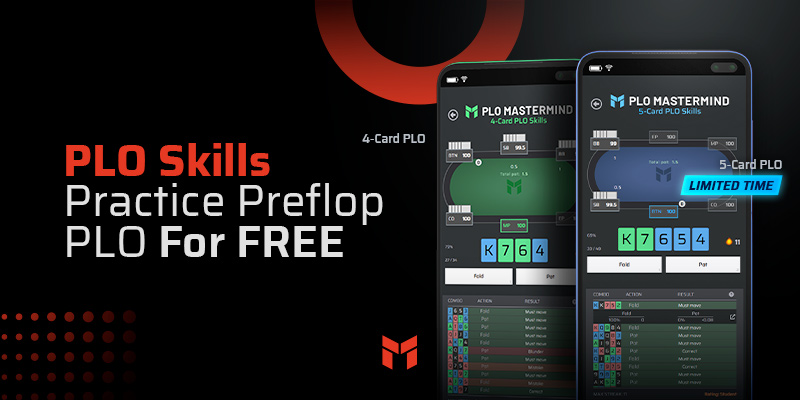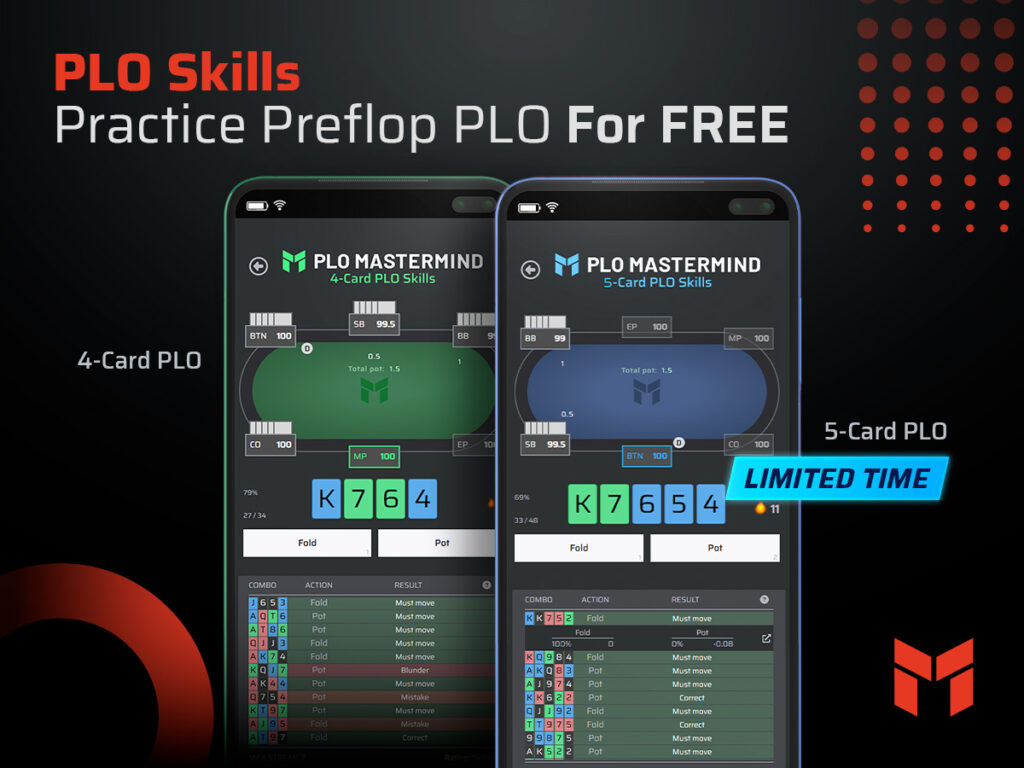In poker, we face many stressful factors like variance, losing hands, and sometimes even dealing with other players. These factors can have a negative impact on our mental game, leading us towards making non-optimal decisions, in other words, make us go on tilt.
The immediate result of going on tilt is under-performing and having bad runs at the poker tables. When you don’t have the mental tools needed to deal with tilt, you can’t solve the underlying problems, and you consequentially get stuck in a cycle of emotional instability.
That’s why we put together this post with three mental tools to minimize poker tilt:
Going on tilt can be a rough experience, but learning how to manage it is crucial to our development. The problem is not tilting, but how being on tilt influences your actions, and how long this effect can last.
The bottom line: it can take a heavy toll on your bankroll.
The very first step you need to take is to realize that there is no poker exercise that will fix the problem of variance, and it’s the same for all the other factors we can’t control.
They’re part of the game.
1. Practice Mindful Awareness

Mindfulness is a state, but it’s also a practice. It’s bringing your attention to what is happening in the present moment, just recognizing the “what is”. What is inside of you, what is in the outside world, and experiencing it without resistance or judgement.
There are two forms of practice in mindfulness.
Formal practice is when you take the time to sit down and meditate on whatever arises at the time. Informal practice is doing everything in your life in a mindful way. Being aware of the present moment. Seeing, feeling, and hearing whatever comes up.
You can eat, drive your car, and even play poker mindfully.
With mindfulness comes a certain sensitivity. You start to realize when is the appropriate time to play or not to play. You learn to savor and enjoy playing, as well as other things in life.
Become Self-Aware
Why are you tilting? Is it poker? Is it really that bad to lose a buy-in? If so, then you’re probably playing in higher stakes than you should. Or, maybe you are putting way too much emphasis on poker, and not enough on your personal life.
Sometimes you’re on tilt and think it’s because of downswings or a bad beat when in reality there are many stressful factors that come together. There may be other areas of your life that you are not happy about, and, of course, they make tilt much worse.
Focus on the positive
It can be very easy to keep thinking about the mistakes you made or why you had a bad beat, and end up steaming. But if you spend all your time and energy on the negative, you’re not leaving a lot of space for happy thoughts.
Thinking positive is one of the hardest things to do, but also the most rewarding.
It’s especially important for poker players. There are so many factors in poker that can enhance negative thought loops and consequently transition into your everyday life.
Practice Acceptance
The problem is not the negative thought or emotion by itself, but the fact that we stick to it for so long. We create these endless loops of thinking about negative thoughts.
That’s a lot of unnecessary pain on top of the actual pain. Instead of focusing on what you can’t change, accept it, and focus on what you can change.
Acceptance is better than fighting, not because it changes the feeling, but because it frees your mind so you can focus on the things that are within your control.
2. Design a Healthy Poker Lifestyle
Many players think that in order to succeed in poker you have to beat everyone. Something incredibly valuable to learn on your poker journey is that there is fierce competition at the tables, but it’s possible to be competitive in a friendly way.
You are not blood sworn enemies that have to fight in all these different areas of life. Of course, its harder to do with your livelihood on the line, but it’s still possible.
When you encounter someone better than you in poker, the feedback is quite harsh. But that doesn’t mean you can’t give them credit.
In essence, you can try to be the best without having to put down other people.
Be Kind to Yourself
There are simply too many factors you can’t control that influence your performance. If you always want to play your absolute very best, you will likely get demotivated.
Don’t try to compete vs. your theoretical maximum.
Setbacks are completely normal, and it doesn’t help at all to criticize yourself. On the contrary, it adds to your stress, making it harder for you to enforce positive changes in your life.
Place yourself in an environment of psychological safety.
Find Your Balance
It doesn’t matter if you’re winning or losing, poker has an addictive attribution to it.
All the aspects of your life have an impact on your performance, and they can all be neglected if poker is your sole importance in life. Not having healthy boundaries will harm your mind, your body, and your game.
Declutter your life
We live in an age where there are more options everywhere than ever before, yet we are not used to it. For most of our evolution, we lived an extremely simple life where the only options were to find food or shelter, and basically not die.

It makes sense to want to pursue a simple life, one where you are not constantly overwhelmed with a large variety of options. Find out what are the most important things in your life, and free up your time and energy to focus on that.
Practice doing less but experiencing more.
3. Train Your Mental Game
When most people think of poker mindset training they think of tilt control, visualization or meditation, and ways to find motivation for hardcore grinding challenges. Few players tap into their full potential because they neglect many other aspects that influence their game.
In the PLO Mastermind Mental Game series, we talk about how to deal with tilt and how to bring your A-game to the table. We also give you scientifically proven methods from modern psychology in combination with practical exercises that you can implement right away.
Mental Game Fundamentals
All the aspects of poker and life influence your performance and your quality of life. With practical tools like meditation, reflection exercises, and psychological models like the PERMA Model.
Check out the course here.
Quick Wins
Small tools and short easy-to-implement exercises, with less explanation but even more practical value. Like the one below, focused on learned helplessness and self-efficacy.
Check out the course here.
The idea is for you to become autonomous in your mental game improvement, and in the long term be able to come up with your own solutions, and even help out your peers.
Strengthen Your Willpower
Nowadays it’s so easy to get short-term gratification. When you look for it in poker by calling too much or playing too aggressively, it will lead to disaster.
You will be punished harshly.
Being able to focus solely on long-term gratification is one of the most valuable skills you can learn. If you are able to resist temptations in life, your poker game will naturally improve.
Additionally, having strong long-term goals that are backed by your values will help you make the hard decisions, and get the bigger reward in the long run.
Conclusion
Living a happy, simple, and balanced life is one of the best things you can do to avoid tilt. Anything that improves your poker game will improve other aspects of your life, and the other way around.
You are the single most important element in your poker game.
Take care of yourself.



